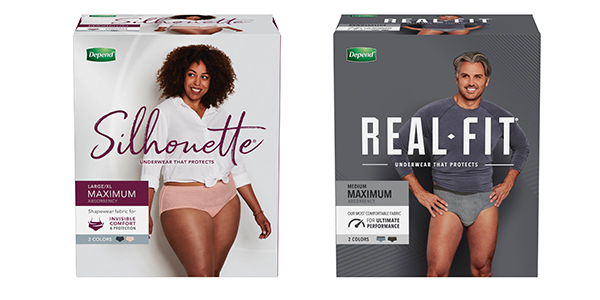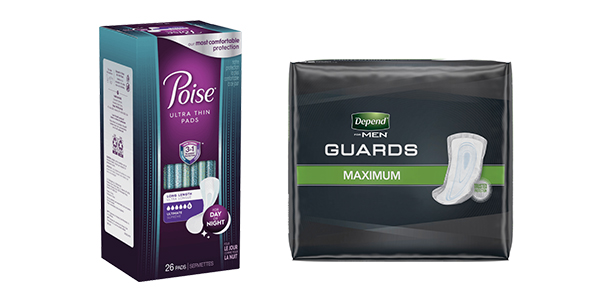Helping a Loved One With Bladder Leakage

SPONSORED CONTENT
At this moment, you likely know someone with bladder leakage but perhaps don’t realize it. With millions of Canadians experiencing some degree of bladder leakage (also known as urinary incontinence), the condition is more common than you might think.
Many people feel inhibited and embarrassed by their symptoms and, as a result, may not be open about their condition. In a recent survey conducted by CARP, the Canadian Association for Retired Persons, many respondents divulged how the fear of others finding out about their incontinence was all consuming and made it extremely difficult to seek help. One female CARP member admitted she goes to great lengths to hide her leakage by wearing only black or navy pants, and never sits on furniture too long, in case she leaves wet spots behind. Another male member shared how he always keeps a light jacket on him so he can wrap it around his waist in case he needs to hide any stains. It became a nuisance and a major inconvenience for him, especially when attending meetings, or spending time with family.
It is essential for loved ones like you (partners, friends, or family members) to play a key role in fostering understanding and empathy so those experiencing bladder leakage can find the support they need to reclaim their lives. You have the power to diffuse the stigma associated with bladder leakage by putting these five easy-to-follow practices in place. These tips can help you understand what your loved one is going through and prepare you to offer invaluable support.
Equip Yourself with the Facts
Understanding bladder leakage can help bridge the gap between those affected and those around them. Many believe bladder leakage occurs only as you age, however, there are a variety of contributing triggers that are irrespective of age; these include genetics, diet, or more commonly, the weakening of pelvic floor muscles. For example, women who have undergone childbirth, which places an inordinate amount of stress on the bladder and other internal organs, are especially susceptible. In men, prostate cancer and its treatment can compromise bladder function. While there are many different causes of bladder leakage, there are also many treatment options available, such as pelvic floor therapy, monitoring your diet, and progressive bladder leakage protection products.
Being equipped with knowledge about the condition and available management options can make it easier for your loved one to open up to you and better allow you to reassure them that they have nothing to be embarrassed about.
Understand Your Role Before You Try to Help
Given the personal nature of bladder leakage, it’s important to gauge the other person’s level of openness and comfort with their condition before approaching the subject or trying to help. Whether they’re just starting to experience symptoms or have had bladder leakage for many years, everyone manages different situations in their own way, just like any other stressors in life.
No matter how you learned of their symptoms, assess what they might need from you and how receptive they would be to your involvement, whether it’s providing emotional support, advice, or your company. Showing them that you are there to support in any way they need is critical in establishing a sense of trust and helping them find a positive way forward.
Exercise Sensitivity from the Start
If you notice someone taking frequent trips to the restroom, be sure not to bring attention to it. It could be that they are trying to cover up a more serious health issue. What may seem like a harmless comment to you, could reinforce their fear of being scorned or worse yet, create for an embarrassing situation. Bathroom habits should not be a casual conversation topic and exercising sensitivity to others’ privacy will go a long way.
Exhibiting discretion and kindness are crucial for your loved one to feel a sense of trust, and potentially turn to you for support.
Listen Intently
It takes a lot of courage for someone to talk about bladder leakage and when they finally make the decision to open up about their experience, a huge burden is lifted off their shoulders. Establishing a sense of trust and understanding can really help someone feel at ease and versus feeling alone, which they may have felt until this point.
When they confide in you, listen attentively and with an open mind. Use positive body language, such as making frequent eye contact and facing them squarely. Your non-verbal cues convey a strong message of caring and support and reinforces to the other person that opening up about their condition was the right decision.
Encourage Them to Seek Support
It’s common for those who experience bladder leakage to either mismanage or not address their symptoms at all. In fact, over 80% of men with leakage don’t use any products at all and 79% of women with leakage either don’t use any products, or use menstrual products that don’t offer protection against leakage or lock in odour the way bladder leakage protection products do. The implications of using the wrong product or not using any product at all are broad-reaching and can include interrupted sleep, cause one to miss out on special occasions for fear of an accident, or lose intimacy in a relationship due to a loss in confidence. Once they are open to seeking a solution, encourage your loved one to talk to their doctor or physiotherapist about managing their bladder leakage. If they’re nervous about speaking to a medical professional alone for fear of embarrassment, offer to accompany them for added support or help them prepare a list of questions that can help them understand the best course of action.
One of the most accessible and effective ways to manage leakage symptoms are through new age bladder leakage protection products. For larger surges and heavier leakage, consider sleek, comfortable disposable undergarments like Depend® Silhouette® Briefs for Women and Depend® Real Fit® Briefs for Men. Offering advanced protection that flexes with every move, both Depend® products feature the smoothest, softest shapewear fabric with an extended range of sizes that flatter any shape. The chic, modern designs create an underwear-like look and feel that is unnoticeable under clothes for an all-day confidence and trusted protection.

There are also solutions that work with your underwear, such as Depend® Guards for Men. The strong adhesive locks the protection in place and the discreet, cup-like shape delivers maximum protection with worry-free odour control so men can go about their day with confidence. Another solution is Poise® Ultra-Thin Pads that offer outstanding protection and extraordinary comfort for women who experience light bladder leaks. The pads move seamlessly with their bodies while quickly wicking away and locking in wetness and odour to offer them security and peace of mind.

When speaking to your loved ones about their options, practicing sensitivity is vital. Reassure them that these widely available management solutions can significantly improve their lives, instill greater confidence in their daily activities, and allow them to enjoy time with friends, family or partners, just as they always have. Embracing change is often harder than we think, especially when it comes to something so personal as giving up their underwear for an absorbent undergarment, but with thoughtful guidance and tactful advice, the right solution can have a profound effect on their lives.

For more information on bladder leakage and a free trial kit of Depend® underwear, visit depend.com.
*If you’re not completely satisfied with your Depend® Underwear, we can help. Original receipt/UPC required. Restrictions apply. See Depend website for details. Purchase by 12/31/24. Mail in by 1/31/25.
